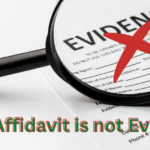Affidavits are often used during civil discovery or as part of a motion before trial. They have generally sworn statements from witnesses that provide information relevant to the case. Affidavits can be helpful in determining what evidence may be admissible at trial and can also be used to impeach a witness’s testimony.
Sometimes, affidavits can often be more effective than live testimony because they are less subject to impeachment and can be more carefully prepared. When used correctly, affidavits can be a powerful tool in the courtroom.
When Can We Use Affidavits?
Affidavits are often used in divorce courts to provide evidence of a spouse’s misconduct. They are typically used to prove adultery, abuse, or other grounds for divorce. Affidavits may be sworn by the party seeking a divorce or by witnesses with knowledge of the spouse’s misconduct. They can be used to show that a person has certain property or debts. They can also be used to show that a person has changed their name. Affidavits can also be used to verify residency. This is often done when someone wants to change their name or get a driver’s license. The affidavit must be signed by a notary public.
Rules To Use Affiavid in Court
An affidavit is a sworn statement made under the penalty of perjury. It can be used as evidence in a court of law and is often used to provide supporting documentation for a legal case. Here are some key points to keep in mind when using an affidavit as evidence:
1. An affidavit must be properly executed – Make sure that the statement you make in your affidavit is accurate and true. If you make any false or misleading statements, it could have serious consequences, including the possibility of perjury charges.
2. An affidavit cannot be used to prove facts – An affidavit can only be used to provide supporting documentation for a legal case. It cannot be used to prove factual information or events.
3. An affidavit must be submitted with the correct paperwork – An affidavit cannot be used without the proper paperwork, including a copy of the legal case in which it is being used and any relevant documents or affidavits that support it.
4. An affidavit can only be used as evidence during the course of a legal case – An affidavit can only be used during the course of a legal case. It cannot be used to provide evidence outside of court proceedings.
Hopefully, these tips will help you use an affidavit correctly and provide useful documentation in your legal cases!
Can an affidavit be used as evidence?
Yes, an affidavit can be used as evidence in a court of law. This document is not considered to be as reliable as testimony from a live witness, but it can still provide useful information if the facts are accurately stated and support the claims made in the affidavit. An affidavit must also meet certain requirements before it can be used in court, such as being signed under oath and filed with proper documentation. Additionally, affidavits must also meet the requirements of truthfulness and accuracy. If you believe that your affidavit would help strengthen your case in a legal proceeding, you should submit it to the appropriate authorities for review.
Affidavit and the Indian Evidence Act:
- The Indian Evidence Act does not apply to affidavits presented to any Court or Officer.
- An affidavit is not evidence under the India Evidence Act. If a Fact is allowed to be proved by an affidavit by C.P.C, Cr.PC or any other law can be proved by affidavit notwithstanding the provision of the Indian Evidence Act vide 1955 Cr.L.J. 1451.
Affidavit and Prosecution:
- Law enjoins that persons making statements on oath or solemn affirmation speaks the truth.
- To file a false affidavit is seriously wrong, and the person who does so can not be said to have respect for the sanctity of an oath.
- A person who binds him on oath to state the truth is bound to state the truth.
- Filing a false affidavit in a Court in proof of a fact relevant to the judicial proceeding, where affidavit evidence is admissible, is an offense as defined in Section 191 I.P.C., which is known as perjury and which is punishable u/s 193 I.P.C.
Author Profile

Latest entries
 QuariesDecember 15, 2022Affidavit of non prosecution Texas
QuariesDecember 15, 2022Affidavit of non prosecution Texas QuariesDecember 4, 2022Self proving affidavit Florida
QuariesDecember 4, 2022Self proving affidavit Florida QuariesDecember 4, 2022Why Affidavit is Not Evidence?
QuariesDecember 4, 2022Why Affidavit is Not Evidence? QuariesDecember 4, 2022Heirship affidavit Alabama
QuariesDecember 4, 2022Heirship affidavit Alabama


